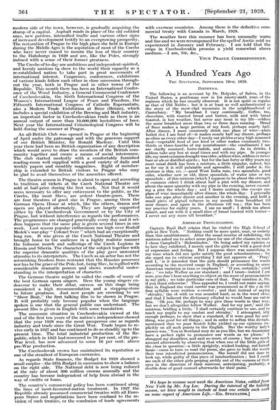A Hundred Years Ago
The following is an account by Dr. Holyoke, of Salem, in the United States, a gentleman now in his ninety-sixth year, of the regimen which he has usually observed. It is not quite so regular as that of Old Nobbs ; but it is at least as well authenticated as the story of the snow-clad mountain in the neighbourhood of Canterbury. " My breakfast I vary continually. Coffee, tea, chocolate, with toasted bread and butter, milk and with bread toasted, in hot weather, but never any meat in my life—seldom the same breakfast more than two or three days running. Bread of flour makes a large portion of my food, perhaps nearly half. After dinner, I most commonly drink one glass of wine—plain boiled rice I am fond of—it makes nearly half my dinner, perhaps as often as every other day—I rarely eat pickles orany high seasoned food—vegetable food of one kind or other makes commonly two- thirds or three-fourths of my nourishment—the condiments I use are chiefly mustard, horse-radish, and onions. As to drinks, I seldom take any but at meal times and with my pipe. In younger life, my mestcommon draught was-cider, seldom wine, seldom or never beer or ale or distilled spirits ; but for the last forty or fifty years my most usual drink has been a mixture, a little singular, indeed, but as for me it is still palatable and agreeable, I still prefer it, the mixture is this, viz. :—good West India rum, two spoonfuls, good cider, whether new or old, three spoonfuls, of water nine or ten spoonfuls ; of this mixture (which I suppose to be about the strength of common cider) I drink about half a pint with my dinner, and about the same quantity with my pipe in the evening, never exceed. ing a pint the whole day ; and I desire nOthing else except one glass of wine immediately after dinner, the whole day. I generally take one pipe after dinner and another in the evening, p.nd hold a small piece of pigtail tobacco in my mouth from breakfast till near dinner, and again in the afternoon till tea ' • this has been my practice for eighty years. I use no muff ; I drink tea about sunset, and eat with it a- small slice of bread toasted with butter— I never eat any more till breakfast."
AMERICAN PRONUNCIATION. -
Captain Basil Hall relates that he visited the High School of girls at New York. "Nothing could be more quiet; neat-, or orderly than this establishment. After the usual-routine of exhibiting, the
mistress asked me to select some piece for one of the classes to read. I chose Campbell's Hohenlinden. On being asked' my opinion as
to how they exhibited, I merely said the girls read with a good deal of expression and feeling. But I suppose there was something in my tone which did not quite satisfy the good schoolmistress ; for she urged me to criticize anything I did not approve Of. Pray.' said I, is it intended that the girls should pronounce the words according to the received usage in England, or according to some American variation in tone or emphasis ? " 0 yes, certainly,' cried she ; we take Walker as our standard ; and trust—indeed I am sure, you don't hear anything to object on the score of pronunciation in my girls ; we take particular "care of that. Pray mention it, Sir, -if you think-otherwise.' Thus appealed to, I could not resist saying, that in England the word combat was pronounced as if the o in the first syllable were written a-cumbat ; and that instead of saying ahivalry,' the ch with us was sounded hard, as in the word chin; and that I believed the dictionary alluded to would bear me out in this. Oh yes, Sir, perhaps he may give these words in that way, but we don't altogether follow Walker. And for my part,' said the mistress, bridling a little, ' I shall certainly continue to use, and to teach my pupils to say combat and chivalry.' I attempted, idly enough perhaps, to show that a standard, if it were good for any- thing, was good for all things ; and in order to soften this dictum, mentioned that we poor Scotch folks yielded up our opinions im- plicitly on all such points to the English. But the worthy lady's answer was, ' You in Scotland may do as you like, but we Americans have a perfect right to pronounce our words as. we please.' I shrugged my shoulders, and said no more, of course • but was much amused afterwards by observing that when one of the little girls of the class in question—a little sprightly, wicked-looking, red-haired laseie—came in turn to read the poem, she gave to both the words their true interdicted pronunciation. She herself did not dare to look up, while guilty of this piece of insubordination ; but I could see each of the other girls peeping archly out of the corners of their eyes in the direction of their mistress, anticipating,, probably, a double dose of good counsel afterwards for their pains.'












































 Previous page
Previous page